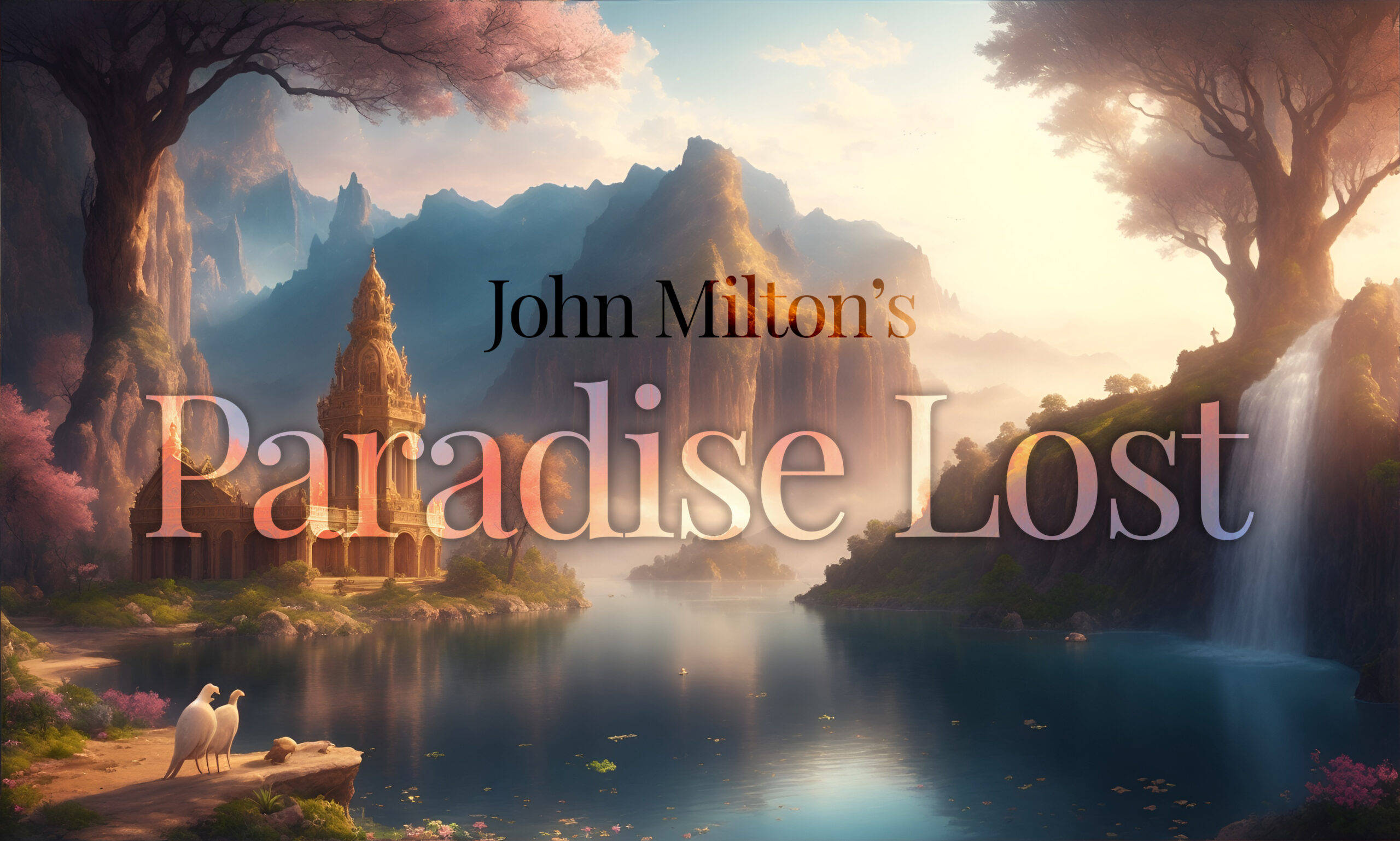
Epic Similies in Paradise Lost
Paradise Lost, John Milton‘s epic poem published in 1667, is renowned for its rich and intricate use of language. One of the distinctive features of Milton’s style is his skillful employment of epic similes, also known as Homeric similes. These extended and elaborate comparisons draw upon a wide range of subjects and metaphors, enhancing the depth and vividness of the narrative. In this analysis, we will explore the significance and impact of epic similes in Paradise Lost, examining their thematic relevance, imaginative qualities, and contribution to the overall epic structure of the poem.
Epic similes serve multiple purposes in Paradise Lost. Firstly, they provide imaginative and sensory descriptions that immerse the reader in the world of the poem. Milton’s detailed and elaborate comparisons enable the reader to visualize and experience the scenes and events being depicted. By drawing parallels between familiar objects or phenomena and the epic events unfolding in the poem, epic similes create a bridge between the known and the unknown, facilitating a deeper understanding and emotional connection with the narrative.
Secondly, epic similes in Paradise Lost enrich the thematic exploration of the poem. They serve as vehicles for conveying complex ideas, emotions, and moral reflections. Milton employs epic similes to delve into the theological, philosophical, and moral dimensions of the narrative, shedding light on profound truths and inviting contemplation. Through these comparisons, Milton explores themes such as the nature of good and evil, the consequences of human actions, the limits of human understanding, and the complexities of divine providence.
An example of an epic simile that highlights the imaginative qualities and thematic significance can be found in Book I of Paradise Lost. In this passage, Milton compares Satan’s size to that of the Titans, drawing upon classical mythology:
“So stretched out huge in length the Arch-fiend lay
Chained on the burning lake, nor ever thence
Had ris’n or heaved his head, but that the will
And high permission of all-ruling Heaven
Left him at large to his own dark designs,
That with reiterated crimes he might
Heap on himself damnation, while he sought
Evil to others, and enraged might see
How all his malice served but to bring forth
Infinite goodness, grace and mercy shown
On Man by him seduced, but on himself
Treble confusion, wrath, and vengeance poured.”
(Book I, lines 192-203)
In this simile, Satan’s colossal size is compared to that of the Titans, the powerful and rebellious giants of Greek mythology. The image of Satan lying “stretched out huge in length” on the burning lake emphasizes his immense stature and the magnitude of his fall. The simile also conveys Satan’s audacity and his desire to challenge the authority of God. By aligning Satan with the Titans, Milton draws parallels between the rebellion of the fallen angels and the mythical struggles of the ancient world, infusing the narrative with a sense of grandeur and historical resonance.
Moreover, this epic simile serves as a vehicle for exploring the themes of free will, divine justice, and the consequences of disobedience. Satan’s “dark designs” and his continued acts of evil are contrasted with the infinite goodness, grace, and mercy shown by God towards humanity. The simile emphasizes Satan’s self-destructive nature and the ultimate futility of his rebellious actions. It underscores the theological implications of his defiance and reinforces the broader moral framework of the poem.
Another notable example of an epic simile in Paradise Lost can be found in Book II, where Milton describes the fallen angels regrouping after their defeat in the war against God:
“As when the Sun new risen
Looks through the horizontal misty air
Shorn of his beams, or from behind the Moon,
In dim eclipse, disastrous twilight sheds
On half the nations, and with fear of change
Perplexes monarchs. Darkened so, yet shone
Above them all the Archangel; but his face
Deep scars of thunder had intrenched, and care
Sat on his faded cheek.”
(Book II, lines 1-9)
In this simile, the Archangel’s appearance is compared to the effect of a solar eclipse or the dimming of the Sun’s rays through mist. The contrast between the obscured Sun and the radiant Archangel emphasizes his elevated status and his unique position among the fallen angels. The simile also conveys a sense of awe and fear, as the Archangel’s scars and careworn countenance hint at the immense struggles and suffering endured in the battle against God.
The simile serves a dual purpose in this passage. Firstly, it captures the physical appearance of the Archangel, highlighting his majestic presence despite the signs of battle and weariness. Secondly, it conveys the psychological and emotional state of the fallen angels, who are described as being in a state of confusion and uncertainty, akin to the nations perplexed by an eclipse. The simile adds depth to the depiction of the fallen angels’ plight, evoking sympathy and underscoring the gravity of their situation.
Milton’s skill in crafting epic similes is further evident in his description of Pandemonium, the capital city of Hell, in Book I. He compares the construction of the city to the building of the Tower of Babel:
“Anon out of the earth a fabric huge
Rose like an exhalation, with the sound
Of dulcet symphonies and voices sweet—
Built like a temple, where pilasters round
Were set, and Doric pillars overlaid
With golden architrave; nor did there want
Cornice or frieze, with bossy sculptures graven;
The roof was fretted gold. Not Babylon,
Nor great Alcairo, such magnificence
Equalled in all their glories, to enshrine
Belus or Serapis their gods, or seat
Their kings, when Egypt with Assyria strove
In wealth and luxury.”
(Book I, lines 710-723)
In this epic simile, the grandeur and opulence of Pandemonium are compared to the magnificent structures of Babylon and Alcairo (Cairo). The simile emphasizes the scale and beauty of the city, with its temple-like architecture adorned with gold, sculptures, and intricate details. The comparison to ancient cities known for their wealth and splendor enhances the sense of grandeur and establishes a historical and cultural context for the reader.
Furthermore, this simile underscores the pride and ambition of the fallen angels in their attempt to create a rival kingdom to heaven. The reference to the Tower of Babel, a symbol of human arrogance and the desire to reach the heavens, adds a layer of irony and reinforces the theme of rebellion against divine authority. The simile conveys the ambition and audacity of the fallen angels, while also foreshadowing their ultimate downfall.
The epic similes in Paradise Lost not only provide vivid descriptions and imaginative qualities but also contribute to the overall structure and unity of the poem. They form an integral part of the narrative fabric, weaving together different themes, characters, and settings. Through their carefully crafted comparisons, Milton expands the scope of the poem, connecting the human and the divine, the earthly and the celestial, and infusing the narrative with a sense of universality and timelessness.
In conclusion, the epic similes in Paradise Lost play a vital role in enhancing the depth, imagery, and thematic resonance of the poem. They offer imaginative descriptions that transport the reader to various realms and evoke emotions and sensory experiences. Through these comparisons, Milton explores profound theological and philosophical concepts, enriches the characterization of the poem’s protagonists, and reinforces the epic structure of the narrative. The epic similes in Paradise Lost stand as a testament to Milton’s poetic genius, contributing to the enduring legacy of this monumental epic.
*****
Read More: Questions and Answers from Paradise Lost by John Milton


